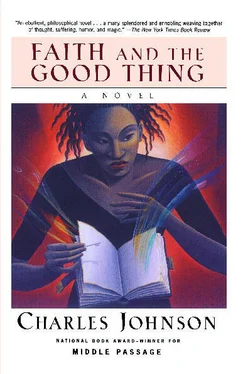Disillusioned, Faith removed her eye. The Swamp Woman slapped her knee and howled; she sailed off her seat, crashed headfirst on the floor, and commenced to rolling around, kicking up her heels, laughing, pointing, and signifying on poor Faith, “Oh, look in the mirror! Hee hee! Look, oh, oh — look, look! ”
Faith hurried to the mirror and saw, encircling her one good eye, a sooty ring. She wiped it off. Shouted, “You’re terrible !” Her throat convulsed with humiliation, and she started to cry, letting it all come out — the misery, disenchantment, and, now, a deep and certain longing for death. “You’re an evil, heartless old witch!” she cried.
That brought the Swamp Woman to her feet; she erupted every now and then with snickers and hid the smile on her face with both her hands. After she had calmed down she placed her right arm around Faith’s shoulders and said, “Girlie, I didn’t mean no harm. Categorically, that trick proceeded from the Good Will. That’s right! It didn’t involve no means-end relationship whereby I said, ‘ If I want to poke fun at girlie, then . ’ Uhn, huhn. I tricked ya ’cause I had to act in such a way that a maxim based on my action might itself become a universal law.” She patted Faith tenderly on the head, then palmed it playfully. “Wouldn’t it be nice if everybody did that to everybody else?”
Weariness had its way with Faith. She felt numb and insulated from the world. Her good eye, though it had no lid, began to darken, slowly, like fermenting wine. “I only came to say good-bye before I die. ”
The Swamp Woman jumped back and stomped her foot on the floorboards. “You’re giving up? Child, you’d better stick your brains back into the stove — they ain’t done yet!”
“The quest is over,” Faith whispered, more to herself than to the werewitch. “I failed. I was a fool—”
“Over? How can it be over when ya only been on one path — and a silly one at that?” The Swamp Woman’s face blackened with rage. “There ain’t no beginnin’ and there ain’t no end.” She stroked her chin in deep meditation. “There ain’t nothin’ but searchin’ and sufferin’, too! To be human is to suffer, child — to feel, to be sentient, y’see? And, if nothin’ else, ya can do what that sweet gal Imani, Kujichagulia’s wife, did.” A smile spread across the Swamp Woman’s face. “Haven’t ya figured out, after all this time, who Imani is?”
Faith was alert now. “You!” She was furious and, since furious, quite alive, her spirit reviving with violence. “You lied to me! You didn’t tell me the whole truth! You said the Good Thing was lost.” Faith trembled with anger. It had all been a great lie from the start. “You lied to me!”
Her accusation so angered the Swamp Woman that she spat upon the floor. The fluid, landing at Faith’s foot, burst into black flames. Dark tears fell from the werewitch’s eyes. “It was lost to Kujichagulia, girlie, not to Imani. Not to me! Did Plato lie when he told Phaedrus that love was a god, and then denied that very same thing before all those folks in the Symposium ? Dialectics don’t hold to no single truth, child; it reaches out for the Good Thing, affirming and negating itself until the Good Thing’s regained.”
Faith held her breath; her words hissed through her teeth. “Did Kujichagulia — did he or did he not find the Good Thing, and then come to ruin?”
Sheepishly the Swamp Woman smiled. “Yes!” She cackled and danced across the room to a corner. There, as Faith simmered with rage, she rifled a box of old rags and produced a doll. “I made this mojo for ya,” she said. “Figured ya might—”
“I don’t want it. I don’t want to see any more of your tricks and Bourbon Street shenanigans ever again!” The doll, Faith realized, was a nearly perfect likeness of Alpha Omega Jones. It even had a tattoo circling its neck. “I just want the truth about the Good Thing.”
The Swamp Woman dropped the doll onto her bench and narrowed her eyes. Smirking. “The logical truth?”
“Yes,” Faith said wearily.
“Got ya ’gain!” the werewitch squealed. “There’s Aristotelian logic, transcendental logic, phenomenological logic, dialectical-materialist logic, symbolic logic, instrumentalist logic—”
“No!” Faith screamed. She balled her fists and, with them, hit her head.
“Then,” the Swamp Woman said craftily, “ya wants the non logical truth, eh?”
Exhausted, Faith supported herself by leaning against the workbench, sick deep inside her stomach. “Why are you playing with me? Haven’t I suffered enough already?”
“Girlie, ya ain’t suffered nothin’ until ya suffer the truth. But I reckon you’re ready for it now. You’re ’bout done with the path of the pristine young innocent, ain’t ya?”
Faith could not answer. She wanted to sleep away the sound of all these confusing words. She looked up toward the Swamp Woman and received a shock she was not, nor could ever be, prepared for. Before her eyes the werewitch proceeded to remove her boil-ravaged skin. She snared two of her sharpest talons in a fold at the nape of her neck, lifted off her face like a cowl, and slipped from the rest as though it were long underwear.
Faith swallowed. “God!”
“Glad you mentioned that,” the Swamp Woman said. “’Cause, like God, the Good Thing’s governed by what’s called the Docta Ignorantia — that is, knowin’ it always implies negativity, ’cause it’s beyond, in the final analysis, everyday understanding.” Skinless, and vigorously scratching her dark liver and spleen, the Swamp Woman lurched across the room to a hook near the door. There she hung her skin and smoothed it out, removing flecks of lint, here and there, from its surface. Her naked white skull turned to Faith and laughed. “Did I tell ya that Kujichagulia left that gal Imani, left me that is, and started climbin’ Mount Kilimanjaro, the elements arisin’ to bring him down, and all that?”
Unable to look directly at the werewitch, and still trying to swallow, Faith lowered herself onto the nearby pallet bed. Said, “Uhh, huhn. ”
“Well, that’s true. Must be. That’s the way I always tell it. It seems to me that after Kujichagulia died in them mountains things got real hard for Imani. She managed to raise her kids and keep life and limb goin’ until they was all grown up, outta her hut, and married. And when that happened, she decided to climb that mountain herself, to die beside her husband (he was confused — lemme tell ya! — but I loved that fool). That night she was climbin’ was as dark as All Hallow’s Eve, child, and it took a long, long time for her to climb it, ’cause she was old, almost crippled, and just a li’l outta her mind. But she kept right on steppin’, just like we all got to do, and on a moonless winter night she got there. Under her bare feet were Kujichagulia’s dry bleached bones. In the air was thunder, and right behind that — lightning. She thought the Good Thing was gone for good, girlie, hidden by them wrathful thick-necked gods. But they took pity on this child. Her eyes were innocent, her heart — bless her soul — never once questioned the good things like Kujichagulia had (I ain’t braggin’ now, that’s why I was called Imani). So the gods dropped down a lightning bolt that lit up the whole sky like the aurora borealis, honey — it twisted around in the shape of the Sign of Solomon and spelled out the words In This Sign Conjure.
“’Cause that’s about the best way there is for callin’ up the Good Thing: conjurin’. Imani took only one path, child. She became a midwife to mystery, y’see? Her hair was as white as hoarfrost, and she started conjurin’ day and night, invokin’ spirits from sweet-gum trees, dredgin’ up demons from the most common things of all. You was like Kujichagulia, girlie, the kind of child who’d forgotten how to play, to sing, and trembled in the darkness instead of enterin’ into it; you clung desperately with both arms to the belief in certainty, and screamed at the wind, the shadows — you were the child whose throat is dry when everyone else’s is filled with song. Y’see, the worst part of restlessness and questionin’ is not insecurity and fear, but just this: insensitivity; the worst part of insensitivity is not torpidity, but loneliness; and the worst part of loneliness is not the lack of friends, but the lack of intimacy with the world, the lack of unity. You was born in the winter of the Age of Reason — an ugly age (or so it is and seems to me), filled with disillusion, rife with conflictin’ theories that bend and fold and mutilate men like a computer card to explain them completely and, through all that, deny their freedom to create. To conjure. You started out as close to the world as the baby is to its momma’s tit, you were it, you felt oceanic feelings so deep they sometimes made you want to cry but, by and by, you got smart. Sho! The tit wasn’t you, after all. Was it, girlie?”
Читать дальше












